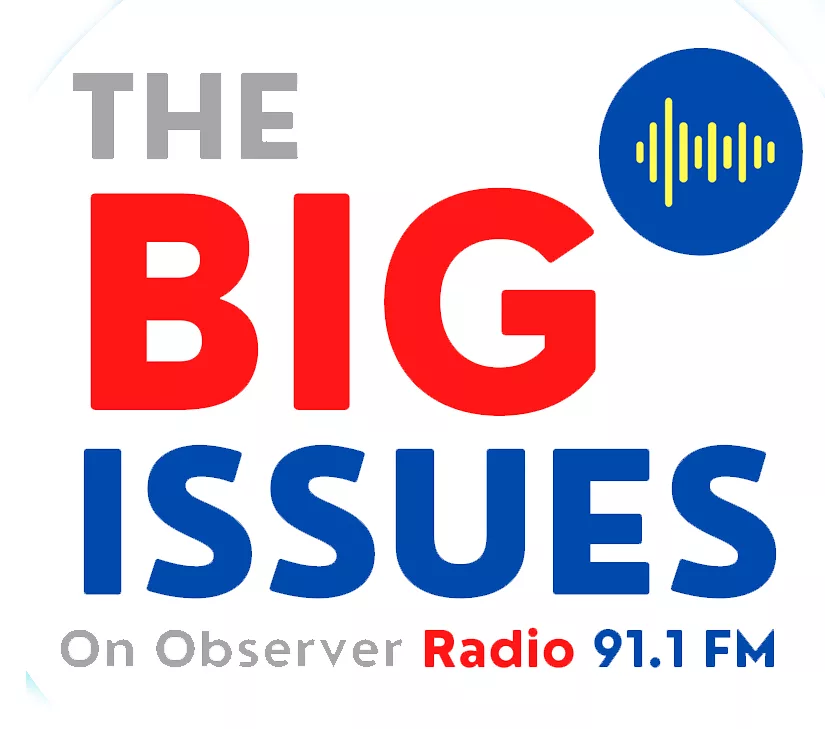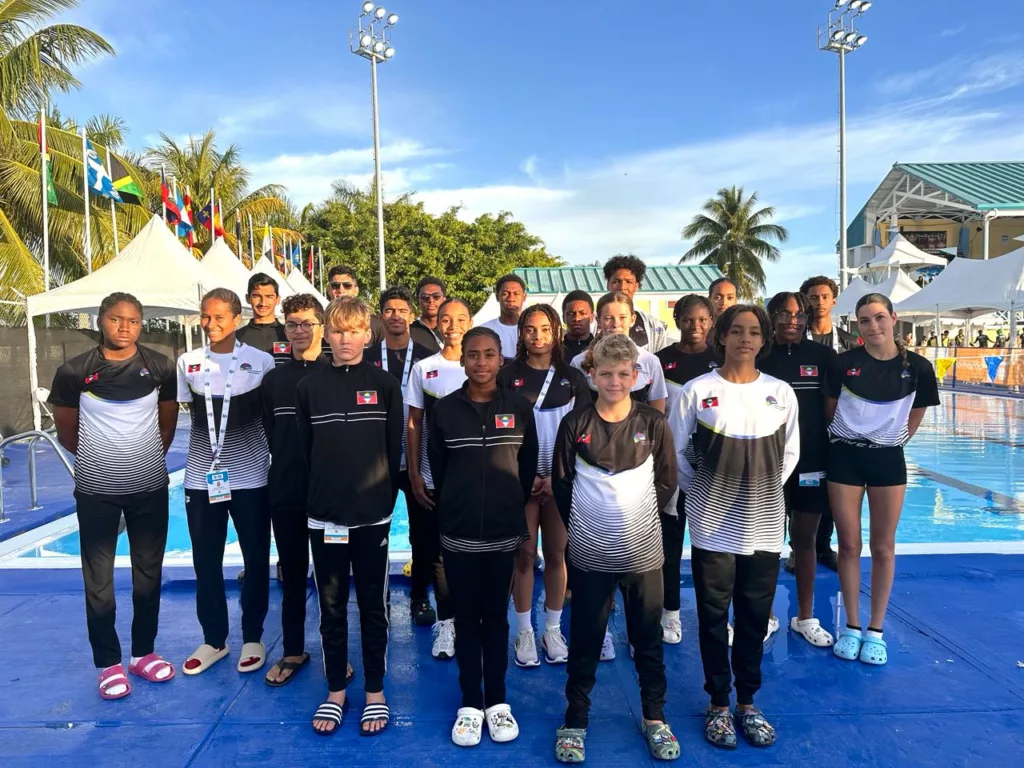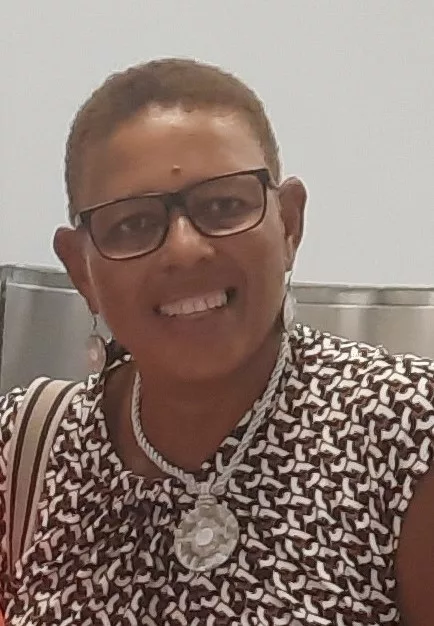
By Barbara Arrindell
Edith Clashing is a local businesswoman who became involved in the sport of swimming when her daughters became involved and started to excel in the sport.
Exposure to the programmes that other countries in the Caribbean and Latin America were engaging their athletes in, helped her realise the need for improvements in the delivery of competitive swim training on the island if the standard of our athletes was to improve.
This led her to spearhead the formation of the Wadadli Aquatic Racers Swim Club in 2006 and to agitate for pool swimming to be embraced by the Swimming Association. This was achieved with the reconstituted Antigua & Barbuda Swimming Federation in 2012.
Clashing has served in many roles – swim mom, swim coach, swim instructor, club administrator, team manager, National Coach, Technical Director of the ABSF, national and international technical official and currently President of the ABSF.
With a passion for aquatic sports in general, Edith looks forward to the day when Antigua and Barbuda can embrace all disciplines including pool swimming, open water swimming, water polo, artistic swimming and diving.
She is also passionate about getting everyone swimming, so she spends time each week teaching swimming to children and adults while promoting it as a life-long activity that should enable us to enjoy our 365 beaches year-round without fear.
Barbara: I wasn’t aware that some of the disciplines that you mentioned are being practiced in Antigua and Barbuda. How does one get involved in artistic swimming, water polo or competitive diving?
Edith Clashing: While the Swimming Federation is responsible for all aquatic disciplines, we do not in fact practice them all at present. We currently only do (pool) swimming (SW) and open water (OW). We need a greater number of swimmers to engage in water polo (a team sport) and facilities (deep enough pool) for artistic swimming (previously called synchronised swimming) and diving.
Barbara: Our swimmers recently did quite well in the Bahamas. What will it take for the team to continue to move up the rankings?
Edith Clashing: As mentioned before in other forums, improving our rankings has been a continuum even when we have had new swimmers enter the arena. It has been a combination of factors that have brought improvement and will continue to do so once we understand and employ them.
Some of these factors include:
Good coaching: This starts at the “learn to swim” levels. Our coaching staff has improved over the years via improved knowledge and training exposures. Accessing more coaches with more experience and improving the training regimes is essential.
Parental support: Our swimmers cannot succeed without the full commitment from their families. Parents need to commit to the daily practices, getting to and from them on time so that schoolwork doesn’t suffer. Parents/guardians and family support are all also needed for financial reasons. It is an expensive sport, that requires personal equipment (goggles, caps, practice and competition suits, kick boards, pull buoys, stretch cords etc). There are also club fees and facility fees that need to be covered.
A facility to train in and adequate pool time: If swimmers are going to compete in pool events, they need pool time. Even open water training requires pool time, as training effects are better measured in a pool. So having access to a pool facility is critical.
Competition: Our swimmers need to compete on a regular basis. Competing locally alone is not adequate. There is the necessity to compete with others who will stretch our swimmers at club and regional events. These experiences build confidence, race strategy, and push an athlete to want to train better, to make improvements. A child may be a big fish in a small pond locally but when they travel, they become small fish in a big pond and have to work really hard to improve their rankings.

All of these factors continue to play an important role in improving rankings. Exposure to other higher-level coaches and holding swim clinics where they can improve techniques and understand their body and nutritional needs are all elements to taking the ante up.
Add to that physiotherapy for injuries and muscle recovery and scientific evaluations and psychology sessions – these are all essential elements.
It’s also important to have a strong local governing body that understands its role and supports all the efforts of clubs and swimmers to help provide opportunities and support.
Barbara: As you said, swimming is not a cheap sport, but some of our potential athletes are probably not yet exposed or discovered because of their economic reality. What would you like to see put in place to open opportunities to others?
Clashing: Two years before the Covid-19 pandemic, the Swimming Federation embarked on a “learn to swim” grassroots programme in five of our government primary schools within the St John’s/St George’s areas. This programme was funded by our governing body through a special development fund. The pandemic, however, saw the end of this initiative. I would like to see such a programme revived so that we can grow it and expand it into more primary schools and eventually into the secondary schools. This would allow us to identify more talent and also achieve the goal of getting our population swimming. The vision is to attract development funding as well as corporate assistance and government support to sustain its growth. Not only will a school league develop but even more athletes will be channeled into existing clubs. This opens up the possibility of swimming scholarships.
Barbara: In terms of competition – what’s next?
Clashing: 2024 is already shaping up to be a busy year. We have our local competitions planned. The next is scheduled for the first weekend in May. Besides this, we have clubs looking at club invitational meets in St Lucia (April) and Barbados and Trinidad toward the end of May.
We’ll be at the Caribbean and Central American Championships in Mexico in June (for a selected national team) and the Olympics of course in July/August where we should have a male and female athlete representing us. Another developmental regional championship, the Goodwill Aquatics, will be held in St Lucia in August and the OECS Swimming Championships are in St Vincent in November.
In between all these targeted events, we know that we will get other invitations but we will not be able to attend many for financial reasons.
There’s no lack of opportunities for swimmers both locally and abroad. There are three open water events coming up. These include the Shark Bait Challenge, a club open water invitational, and our national open water towards the end of the year.
The Short Course World Championship in Budapest in December will close the year for us. We have quite a packed calendar.

